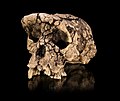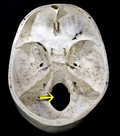quadruped 'four feet'. Limited and exclusive bipedalism can offer a species several advantages. Bipedalism raises the head; this allows a greater field...
80 KB (9,557 words) - 15:09, 1 November 2024
facultatively bipedal species employ different types of bipedalism corresponding to the varying reasons they have for engaging in facultative bipedalism. In primates...
26 KB (3,174 words) - 19:59, 31 March 2024
less costly than both quadrupedal and bipedal walking in chimpanzees. Some hypotheses have supported that bipedalism increased the energetic efficiency of...
21 KB (2,658 words) - 06:49, 28 July 2024
Homininae (section Evolution of bipedalism)
arboreal type of bipedalism. The evolution of bipedalism encouraged multiple changes among hominins especially when it came to bipedalism in humans as they...
30 KB (2,975 words) - 19:36, 24 October 2024
Orrorin (section Evolution of bipedalism)
studies Orrorin tugenensis is a basal hominid that adapted an early form of bipedalism. Based on the structure of its femoral head it still exhibited some arboreal...
19 KB (1,901 words) - 19:42, 24 October 2024
Geosciences, Roberto Macchiarelli, who considered it to be inconsistent with bipedalism contra what Brunet et al. had earlier stated in their description analysing...
29 KB (3,023 words) - 12:48, 28 October 2024
Human evolution (section Bipedalism)
There are several theories of the adaptation value of bipedalism. It is possible that bipedalism was favored because it freed the hands for reaching and...
263 KB (26,340 words) - 17:42, 3 November 2024
evidence of hominin bipedalism at that time. Subsequently, older Ardipithecus ramidus fossils were found with features that suggest bipedalism. With the footprints...
24 KB (2,804 words) - 04:11, 27 September 2023
savannah hypothesis (or savanna hypothesis) is a hypothesis that human bipedalism evolved as a direct result of human ancestors' transition from an arboreal...
19 KB (2,530 words) - 06:16, 28 July 2024
she inhabited a forest type of environment, contrary to the theory that bipedalism originated in savannahs. Ardi was not the first fossil of A. ramidus to...
15 KB (1,513 words) - 13:19, 30 October 2024
that it is not directly caused by a physiological change to bipedalism may suggest bipedalism was not, at least, the sole cause of concealed ovulation in...
25 KB (3,178 words) - 13:56, 29 October 2024
Aquatic ape hypothesis (section Wading and bipedalism)
characteristics of modern humans such as functional hairlessness and bipedalism. The popular science writer Elaine Morgan supported this hypothesis in...
41 KB (4,981 words) - 17:47, 23 October 2024
Nonetheless, it remains a matter of controversy as to how bipedalism first emerged. The advantages of bipedalism were that it left the hands free to grasp objects...
48 KB (5,126 words) - 12:00, 4 October 2024
have traits similar to that of human beings including upright stance, bipedalism, opposable thumbs, facial features, etc. Annihilus is number 94 Archived...
15 KB (174 words) - 00:14, 23 February 2024
that was bipedal and upright, akin to that of humans (and other hominins); this combination supports the view of human evolution that bipedalism preceded...
39 KB (4,470 words) - 23:53, 3 October 2024
Modern humans have morphologically evolved to survive as bipeds, however, bipedalism has resulted in skeletal changes that have consequently narrowed the pelvis...
21 KB (2,288 words) - 07:00, 29 October 2024
spectrum-binocular vision (i.e. having two eyes), or biomechanic plantigrade-bipedalism (i.e. the ability to walk on heels and metatarsals in an upright position)...
18 KB (2,017 words) - 21:14, 23 October 2024
Tropidurus torquatus (section Bipedalism)
geographical ranges. Another notable behavior of the T. torquatus is occasional bipedal locomotion. It can run relatively quickly on its hind feet for a limited...
14 KB (1,345 words) - 23:15, 7 April 2024
be bipedal. The shift in the foramen magnum moving towards a more anterior position in the cranium, gives rise to the idea of possible bipedalism. Skull...
14 KB (1,730 words) - 17:19, 17 October 2024
earliest hominids indicates that bipedalism evolved from an ancestor already adapted for terrestrial locomotion. ... Pre-bipedal locomotion is probably best...
25 KB (3,106 words) - 12:20, 5 October 2024
three limbs. Real-world tripedalism is rare, in contrast to the common bipedalism of two-legged animals and quadrupedalism of four-legged animals. Bilateral...
4 KB (449 words) - 13:31, 25 September 2024
orangutans), human anatomy suggests that brachiation may be an exaptation to bipedalism, and healthy modern humans are still capable of brachiating. Some children's...
12 KB (1,419 words) - 15:42, 7 September 2024
both hanging in trees (suspensory behavior) and walking on two legs (bipedalism)—whereas, among present-day great apes, humans are better adapted for...
14 KB (1,642 words) - 11:48, 4 July 2024
Clarisse, N. D. (2022). "Postcranial evidence of late Miocene hominin bipedalism in Chad". Nature. 609 (7925): 94–100. Bibcode:2022Natur.609...94D. doi:10...
218 KB (19,309 words) - 20:41, 29 October 2024
genus Homo. They are great apes characterized by their hairlessness, bipedalism, and high intelligence. Humans have large brains, enabling more advanced...
267 KB (25,501 words) - 22:52, 3 November 2024
March 2024. Retrieved 25 January 2024. Dhingra P (2004). "Comparative Bipedalism – How the Rest of the Animal Kingdom Walks on two legs". Anthropological...
222 KB (23,150 words) - 10:54, 2 November 2024
between man and beast at the time the poem was written was simply man's bipedalism, the given description of Grendel being man-like does not necessarily...
17 KB (1,939 words) - 12:57, 20 October 2024
classifying the fossils of Homo coincides with evidence of: (1) competent human bipedalism in Homo habilis inherited from the earlier Australopithecus of more than...
92 KB (7,999 words) - 18:59, 30 October 2024
about two million years ago. … [T]he late australopithecines, already bipedal, were beginning to show changes in teeth, skull, and brain that presage...
24 KB (2,424 words) - 14:41, 15 October 2024
large penises as well as large breasts. Furthermore, early humans adopted bipedalism and face-to-face coitus. He therefore suggested enlarged sexual signals...
74 KB (8,135 words) - 23:36, 5 September 2024























